Silent Era Home Page > Home Video > The Epic of Everest

Reviews of silent film releases on home video.
Copyright © 1999-2025 by Carl Bennett
and the Silent Era Company.
All Rights Reserved. |
|
The Epic of
Everest
(1924)
|
This historic documentary of the second expedition to attempt to summit Mount Everest in Tibet was shot and directed by Captain John B.L. Noel, a fellow of the Royal Geographical Society. Noel had been part of the 1922 British expedition, the first to attempt to summit the mountain, and had produced a short documentary of the failed ascent entitled Climbing Mount Everest (1922).
Noel arranged to once again to be the official photographer/filmmaker for the 1924 expedition led by George Mallory and Andrew Irvine, with C. Geoffrey Bruce and Edward F. Norton.
The intertitle-heavy documentary is hampered a bit by its static views of slow treks of the expedition party through rocky landscapes or of their sparce encampments. Still, there are several wow moments in the film, as the awesome Tibetan cliff-top settlements are nearly as impressive as the frozen mountain scenics. The sheer beauty of the ice alone makes the film worth multiple viewings.
Noel often employs time-lapse cinematography to give an impression of the natural power of Everest, with its peak scraping the underbelly of the sky producing long wind-swept clouds of snow that blow away from the summit for miles.
There are the views of Tibetans and their activities that will be of interest to many, whether it of traditional head dresses and clothing, musical performances, or of daily prayers. And, there is even a surprise appearance by William S. Hart posing as a Tibetian musician (we’re kidding!).
Soon, however, the expedition party begins its trek toward the mountain and gains altitude over the highest human settlement. Our familiarity with the appearance of the thick mountain climbing gear of today leaves us astounded with the thin clothes that the expedition members wear, which appears to be little more than tweedy British street clothing. It is a wonder that the entire party did not succomb to frostbite. Yet, two men in the climbing party died however when the weather suddenly turned on their efforts to establish depot camps at 25,000 and 27,000 feet up the mountain.
The motion picture equipment could not be transported beyond approximately 22,000 feet, so Noel sought a vantage point and filmed the party with a specially-designed telephoto lens as they made the push for the summit. An intertitle claims that Mallory and Irvine, with the aid of bottled oxygen, at least made an ascent to 28,400 feet.
It is said that Captain Noel gave members of the climbing party small cameras which were to be used to document their climb to the peak. These cameras have been the focus of latter-day interest in the expedition, as they may hold the only proof in the form of undeveloped photographs that the climb succeeded. Again, the weather changed for the worse and whether or not Mallory and Irvine were able to reach the peak or not, the pair suffered a catastrophic accident while ascending or descending. The pair could not be found and after days of diminishing hope, the expedition party began the long trek down.
The well-preserved body of George Mallory was discovered in 1999 and was buried on Everest near the spot where he died. The body of Andrew Irvine remains lost, and the mystery of whether the pair were the first to conquer Mount Everest is still unanswered.
— Carl Bennett
|
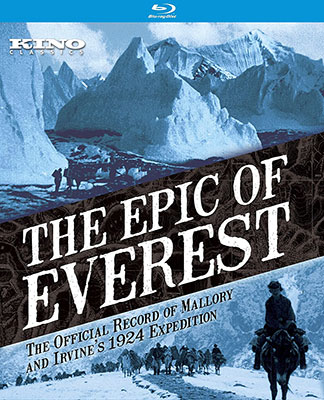 Kino Classics Kino Classics
2015 Blu-ray Disc edition
The Epic of Everest (1924), black & white, color-tinted black & white, and color-toned black & white, 87 minutes, not rated.
Kino Lorber, K1833, UPC 7-38329-18332-5.
One single-sided, single-layered, Region A Blu-ray Disc; 1.33:1 aspect ratio picture in pillarboxed 16:9 (1920 x 1080 pixels) 24 fps progressive scan image encoded in SDR AVC format at 27.8 Mbps average video bit rate; DTS-HD Master Audio 5.1 surround sound encoded at 2.4 Mbps audio bit rate, and DTS-HD Master Audio 2.0 stereo sound encoded at 1.8 Mbps audio bit rate; English language intertitles, no subtitles; 10 chapter stops; standard BD keepcase; $29.95.
Release date: 8 September 2015.
Country of origin: USA
Ratings (1-10): video: 9 / audio: 8 / additional content: 5 / overall: 9.
|
|
This Blu-ray Disc edition utilizes the high-definition video transfer produced by the British Film Institute from their 2013 restoration 35mm print. The main 35mm source material was Captain John Noel’s personal exhibition print, originally used for his personal appearances on stage, with an original color-tinted circulation print utilized as a continuity and color-tinting guide and providing unique footage.
Overall, the source material is predominantly excellent. Early, establishing shots of Mount Everest show signs of beginning nitrate decomposition, much of which has been digitally repaired to an extent but could not totally be restored. Some shots show a pronouned film grain, which is readily apparent in still frames, and some shots are a relatively smooth transition of greytones. The bulk of the film, digitally cleaned of many of its surviving flaws, is of excellent quality.
The film is accompanied by a nontraditional music score composed, orchestrated and conducted by Simon Fisher Turner, which is comprised of synthesizer pieces, native instuments, ambient sound and field recordings.
Supplemental material includes an introduction with Sandra Noel, daughter of Captain John Noel, and Bryony Dixon of the BFI (16:9 format, 9 minutes); a featurette on scoring the film with Simon Fisher Turner (16:9 format, 6 minutes); and a featurette on the restoration of the film with members of the BFI restoration team, Bryony Dixon and Ben Thompson of the BFI National Archive, and Lisa Copson of Deluxe Digital, London (16:9 format, 6 minutes); and a new trailer for the home video edition (16:9 format, 2 minutes).
This Blu-ray Disc presentation is our recommended home video edition for collectors in the North American market.
|
|
This Region A Blu-ray Disc edition is available directly from . . .
|

|
|
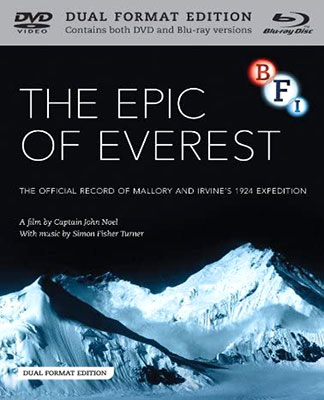 British Film Institute British Film Institute
2014 Blu-ray Disc / DVD edition
The Epic of Everest (1924), black & white, color-tinted black & white, and color-toned black & white, 87 minutes, BBFC Certification U.
British Film Institute,
unknown catalogue number, unknown UPC number.
One single-sided, dual-layered, Region B Blu-ray Disc; 1.33:1 aspect ratio picture in pillarboxed 16:9 (1920 x 1080 pixels) 24 fps progressive scan image encoded in SDR AVC format at ? Mbps average video bit rate; DTS-HD Master Audio 5.1 surround sound encoded at 1.5 Mbps audio bit rate, and Dolby Digital (AC3) 2.0 stereo sound encoded at ? Kbps audio bit rate; English language intertitles, no subtitles; chapter stops; and one single-sided, dual-layered, Region 2 DVD disc; 1.33:1 aspect ratio picture in full-frame 4:3 (720 x 576 pixels) interlaced scan image encoded in SDR MPEG-2 format at ? Mbps average video bit rate (capable of progressive scan upscaling to ? fps); DTS-HD Master Audio 5.1 surround sound encoded at ? Kbps audio bit rate, and Dolby Digital (AC3) 2.0 stereo sound encoded at 448 Kbps audio bit rate; English language intertitles, no subtitles; chapter stops; standard two-disc BD keepcase; £19.99.
Release date: 27 January 2014.
Country of origin: England
|
|
This dual-format Blu-ray Disc / PAL DVD edition has been transferred in high-definition from the 2013 35mm 4K digital restoration of the film prepared by the British Film Institute. The main 35mm source material was Captain John Noel’s personal exhibition print, originally used for his personal appearances on stage, with an original color-tinted circulation print utilized as a continuity and color-tinting guide and providing unique footage.
The film is accompanied by a music score composed, orchestrated and conducted by Simon Fisher Turner, with an alternative performance of the original 1924 score as recreated by Julie Brown.
Supplemental material includes an introduction with Sandra Noel, daughter of Captain John Noel, and Bryony Dixon of the BFI (9 minutes); a featurette on scoring the film with Simon Fisher Turner (6 minutes); and a featurette on the restoration of the film with members of the BFI restoration team, Bryony Dixon and Ben Thompson of the BFI National Archive, and Lisa Copson of Deluxe Digital, London (6 minutes); additional music pieces that accompanied the film on its first screening at the Scala in 1924; a PDF reproduction of the original 1924 film programme (DVD only); and an illustrated insert booklet featuring an essay by Wade Davis.
This dual format edition is our recommended home video edition for European collectors. North American collectors will need a region-free Blu-ray Disc player and/or a region-free PAL DVD player capable of outputting an NTSC-compatible signal to view this edition.
|
|
This Region B Blu-ray Disc / Region 2 DVD edition is available directly from . . .
|

|
|
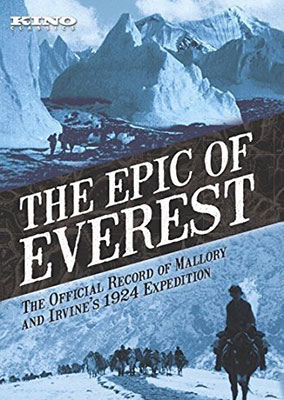 Kino Classics Kino Classics
2015 DVD edition
The Epic of Everest (1924), black & white, color-tinted black & white, and color-toned black & white, 87 minutes, not rated.
Kino Lorber, K1832, UPC 7-38329-18322-6.
One single-sided, single-layered, Region 1 NTSC DVD disc; 1.33:1 aspect ratio picture in full-frame 4:3 (720 x 480 pixels) interlaced scan image encoded in SDR MPEG-2 format at 8.0 Mbps average video bit rate (capable of progressive scan upscaling to 60 fps); Dolby Digital (AC3) 5.1 surround sound encoded at 448 Kbps audio bit rate, and Dolby Digital (AC3) 2.0 stereo sound encoded at 192 Kbps audio bit rate; English language intertitles, no subtitles; 10 chapter stops; standard DVD keepcase; $24.95.
Release date: 8 September 2015.
Country of origin: USA
Ratings (1-10): video: 8 / audio: 8 / additional content: 5 / overall: 8.
|
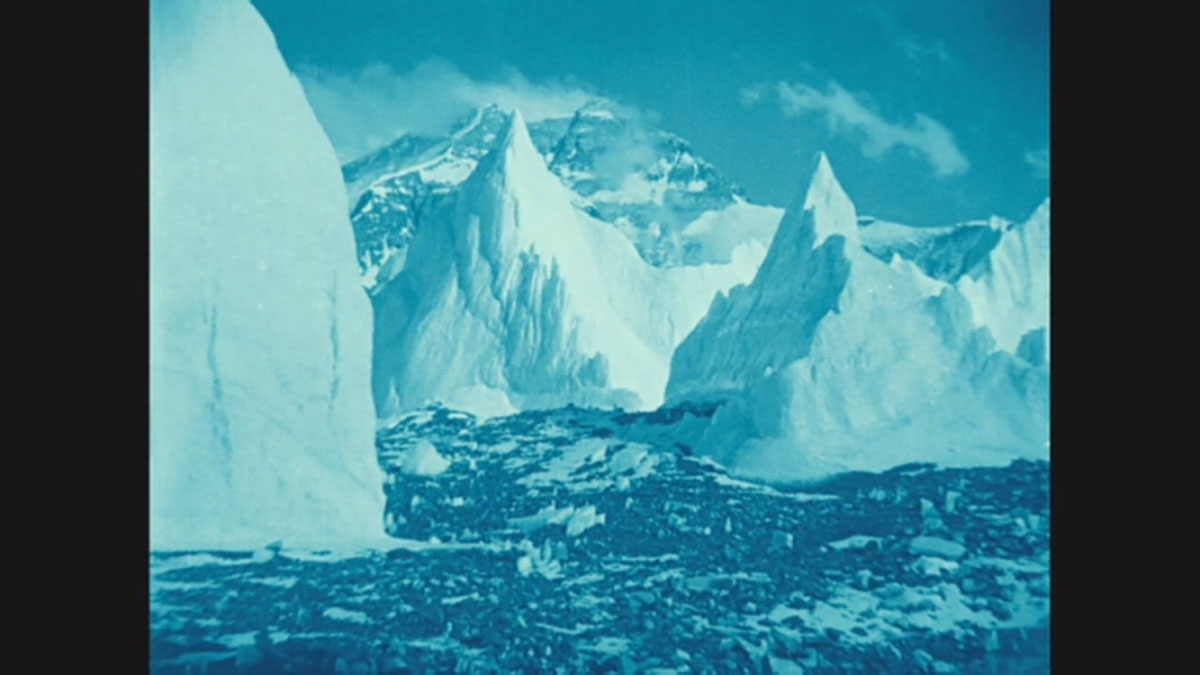
This DVD edition utilizes the high-definition video transfer produced by the British Film Institute from their 2013 restoration 35mm print. The main 35mm source material was Captain John Noel’s personal exhibition print, originally used for his personal appearances on stage, with an original color-tinted circulation print utilized as a continuity and color-tinting guide and providing unique footage.
Overall, the source material is predominantly excellent. Early, establishing shots of Mount Everest show signs of beginning nitrate decomposition, much of which has been digitally repaired to an extent but could not totally be restored. Some shots show a pronouned film grain, which is readily apparent in still frames, and some shots are a relatively smooth transition of greytones. The bulk of the film, digitally cleaned of many of its surviving flaws, is of excellent quality. As would be expected, this standard-resolution DVD benefits greatly from its high-resolution mastering. Picture details are very-good to excellent, with the DVD standard resolution sometimes diminishing and smoothing some of the film grain that is more pronounced in some shots of the Blu-ray Disc edition noted above.
The film is accompanied by a nontraditional music score composed, orchestrated and conducted by Simon Fisher Turner, which is comprised of synthesizer pieces, native instuments, ambient sound and field recordings.
Supplemental material includes an introduction with Sandra Noel, daughter of Captain John Noel, and Bryony Dixon of the BFI (16:9 format, 9 minutes); a featurette on scoring the film with Simon Fisher Turner (16:9 format, 6 minutes); and a featurette on the restoration of the film with members of the BFI restoration team, Bryony Dixon and Ben Thompson of the BFI National Archive, and Lisa Copson of Deluxe Digital, London (16:9 format, 6 minutes); and a new trailer for the home video edition (16:9 format, 2 minutes).
For North American collectors that have not made the jump to Blu-ray Disc, this is our recommended DVD edition of this historic documentary.
|
This Region 1 NTSC DVD edition has been discontinued
and is . . .
|

|
|
|
Other DOCUMENTARY FILMS of the silent era available on home video.
|
|

LINKS IN THIS COLUMN
MAY TAKE YOU TO
EXTERNAL WEBSITES
•
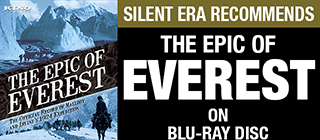
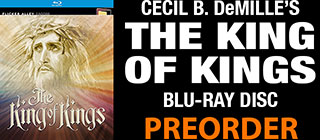
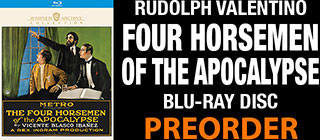
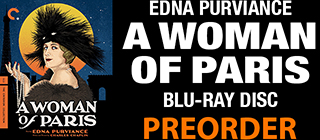
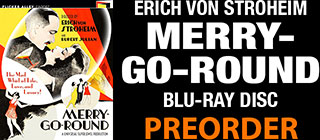
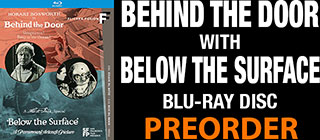
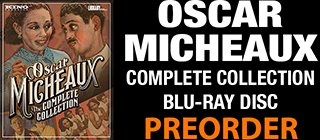
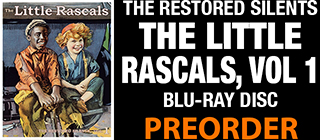
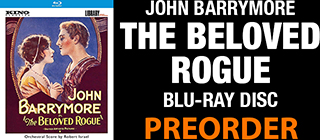
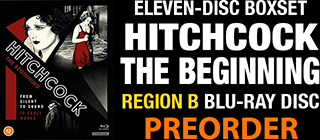
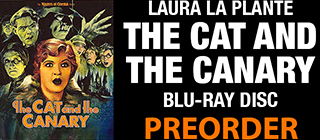
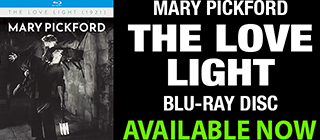
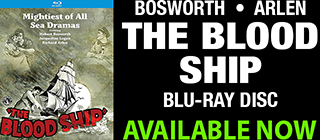
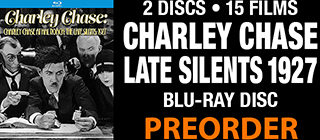
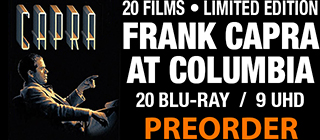
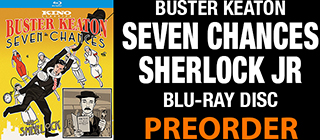
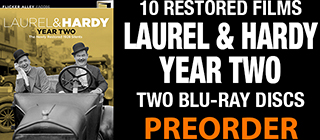


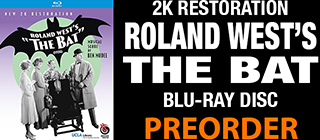


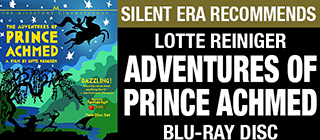
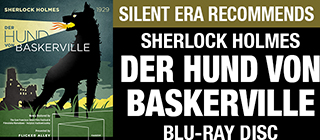

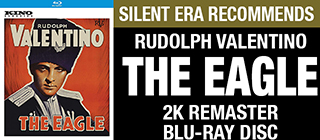
•
|




































